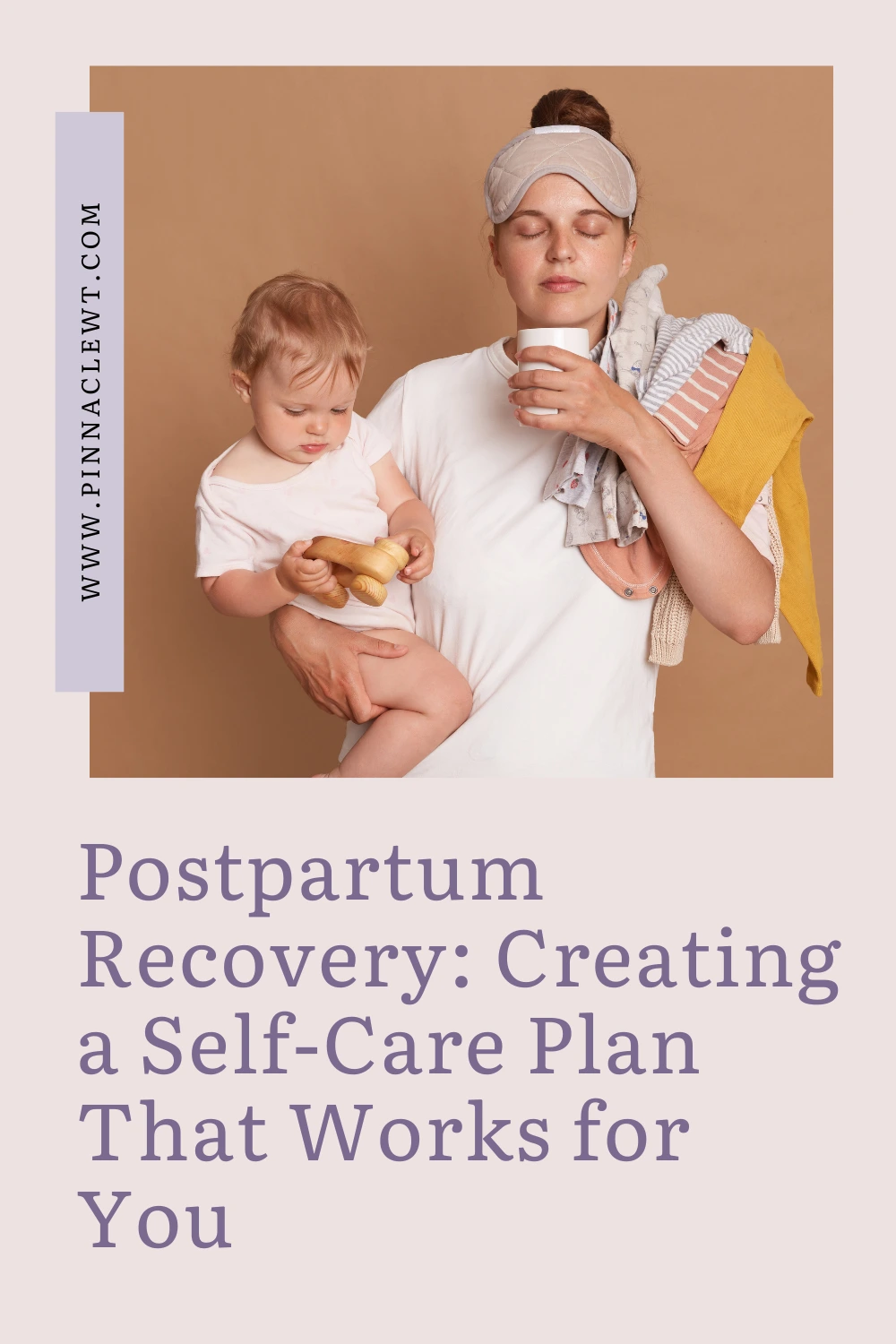Postpartum Recovery: Creating a Self-Care Plan That Works for You
The postpartum period is often described as the “fourth trimester,” but the truth is recovery after giving birth lasts much longer. Postpartum is now recognized as a journey that can span up to seven years, as the body continues to adapt and recover from the physical, hormonal, and emotional demands of pregnancy, birth, and early motherhood. Hormonal changes, lingering muscle weakness, and shifts in core and pelvic floor function often take time to address, while emotional recovery can parallel the challenges of adjusting to a new identity and lifestyle.—not just the first few weeks or months after delivery. If you’re reading this while holding your newborn, or even if you’re months or years into postpartum, know this: it is never too late to focus on your recovery and self-care.
I’ll be honest—after my first delivery, I had no idea what to expect. I even broke my lower leg a week before my due date, so my body had a lot to recover from. On top of that, I had a significant birth injury. You’d think working in a pelvic PT clinic would mean I knew all the options for healing my body, but no one even mentioned pelvic floor therapy to me. At that time, there was only one pelvic PT in town, and I wasn’t aware of them.
Thankfully, today, we have so many more options for support—but postpartum care is still often treated as an afterthought. Women are left to navigate in the dark, trying to figure out their new “normal” while caring for a baby and balancing a household, work, and relationships.
Here’s the truth: if you don’t prioritize self-care, it simply will not happen. And your body—your strength, energy, and well-being—matters. Below, I’ll walk you through simple but powerful ways to create a personalized postpartum self-care plan that works for you, no matter where you are in your recovery.
Step 1: Prioritize Rest and Listen to Your Body
Rest is often dismissed as a luxury, but it is a necessity for postpartum recovery. Pushing too hard too soon can worsen symptoms, including:
- Increased bleeding
- Pelvic heaviness or pressure
- Pelvic or back pain
If you notice heaviness or pressure, your body is asking you to slow down. Get horizontal for 10–15 minutes—this position reduces strain on your pelvic ligaments and organs and gives your body a chance to reset.
Simple ways to rest:
- Lay flat on your back with your legs propped up on the couch or ottoman.
- Nap when your baby naps (easier said than done, I know, but even short rests add up).
- Ask for help with household tasks so you can focus on recovery.
Step 2: Fuel Your Recovery with Nutrition and Hydration
Your body’s nutrient stores, especially minerals like magnesium, are low postpartum. Supporting your body with the right nutrients can help balance hormones, restore energy, and prevent common challenges like constipation or fatigue.
Key Nutritional Focus
- Magnesium: Essential for hormonal balance, energy production, and easing constipation. Consider magnesium glycinate or malate for daily support. Magnesium-rich foods include spinach, avocado, almonds, cashews, and dark chocolate.
- Protein: Aim for at least 75–100 grams of protein per day to support tissue repair strength, and overall recovery.
- Hydration: Electrolytes are key! Plain water alone isn’t enough. Add electrolyte mixes (without added sugars), a pinch of sea salt, or coconut water to help your body rehydrate
more effectively.
3 Favorite High-Protein Recipes
1. High-Protein Berry Yogurt Bowl
-
- 1 cup Greek yogurt (20g protein)
- ½ cup mixed berries
- 1 tablespoon chia seeds
- 1 tablespoon almond butter Sprinkle of granola (optional)
Simple, refreshing, and packed with nutrients.
2. Bone Broth Protein Smoothie
-
- 1 scoop unflavored or vanilla bone broth protein powder (20g protein)
- 1 frozen banana
- 1 tablespoon peanut butter
- 1 cup unsweetened almond milk
- Dash of cinnamon
A quick and nourishing drink for busy mornings.
3. Egg and Veggie Breakfast Muffins
-
- 6 large eggs
- 1 cup chopped spinach
- ½ cup cherry tomatoes, diced
- ¼ cup shredded cheese
- Salt and pepper to taste
Whisk ingredients together, pour into muffin tins, and bake at 350°F for 20 minutes. Easy to grab and full of protein.
Step 3: Gentle Movement and Breathwork
Exercise in the early weeks of postpartum doesn’t need to be intense or long—it’s about reconnecting to your body and your breath. Small, intentional movements for just 5–10 minutes can also benefit your mental health by reducing stress and improving mood. These short bouts of movement provide a gentle reset for both your body and mind, helping you feel more centered during this new and often overwhelming season. can make a big difference.
Early postpartum movement tips:
- Start in horizontal postures, like hands and knees, to reduce strain on your core and pelvis.
- Focus on breathing: Inhale deeply through your nose for a count of 4, expanding your belly and pelvic floor like a balloon. Pause for a moment, then softly blow out through pursed lips, allowing your belly and pelvic floor to deflate and recoil.
- Relieve tension from forward-leaning postures (nursing, carrying baby) by lying flat onbyour back with legs propped up.
Step 4: Build Your Support Team
You don’t have to do this alone. Building a postpartum support team can make all the difference in your recovery, both physically and emotionally. Alongside physical care, mental health support is just as important. Consider reaching out to a counselor or therapist who specializes in postpartum mental health. They can provide tools to navigate the emotional challenges of this season, such as managing stress, processing birth experiences, or addressing postpartum anxiety or depression.
- Pelvic Floor Physical Therapy: Pelvic PT is not a luxury—it’s a necessity for healing your core and pelvic floor. Whether you’re dealing with heaviness, pain, incontinence, or just want to feel strong again, a pelvic PT can guide you through recovery. Pelvic floor issues can often carry an emotional weight, leaving many women feeling frustrated, disconnected, or even overwhelmed. A pelvic PT takes a holistic approach to care, addressing both the physical and emotional aspects of healing, and helping you feel more confident and supported in your postpartum journey
- Lactation Support: Breastfeeding doesn’t always come naturally, and that’s okay. Many lactation consultants offer home visits, which can be a game-changer in those early weeks.
- Postpartum Chiropractor: Look for one who specializes in pregnancy and postpartum care to address alignment, pain, and tension for both you and your baby.
- Postpartum Doulas: Doulas aren’t just for birth! Postpartum doulas can help with newborn care, household tasks, and supporting you as you recover.
Step 5: Make It Work for You
Self-care doesn’t have to be perfect, but it does need to be intentional. Start small, be consistent, and give yourself grace. Taking small steps each day not only helps your body recover but can also ease feelings of overwhelm and reduce stress. Remember, prioritizing hese moments of care supports both your physical and mental well-being, which is essential as you navigate this new season of life.
- Rest when your body needs it.
- Nourish your body with magnesium, protein, and hydration.
- Move gently, focusing on breath and connection.
- Ask for help and lean on your support team.
You Deserve to Feel Supported and Strong
Postpartum is a long journey, and your well-being matters. Whether you’re weeks, months, or years into recovery, it’s never too late to focus on yourself.
Ready to take the next step?
- Contact us for an in-person or virtual pelvic PT session to support your recovery.
- Download our Postpartum Self-Care Checklist to create a plan that works for you.
Your body has done incredible things—now it’s time to support it in healing and thriving




